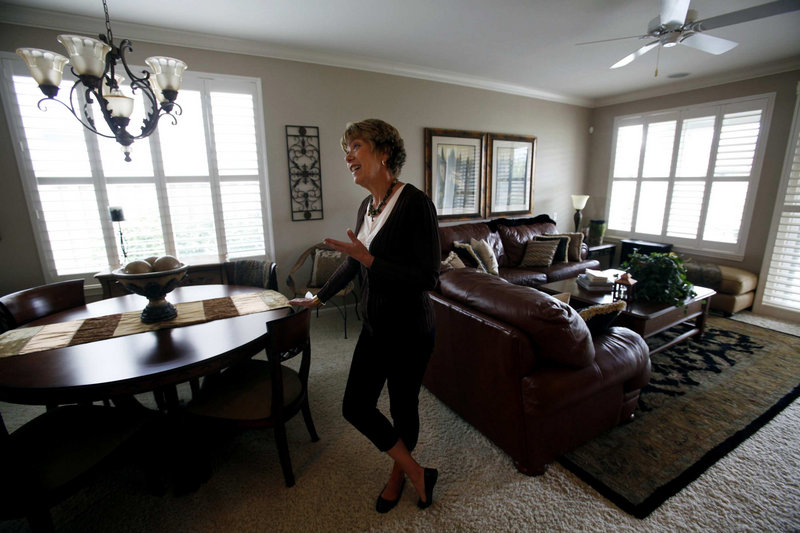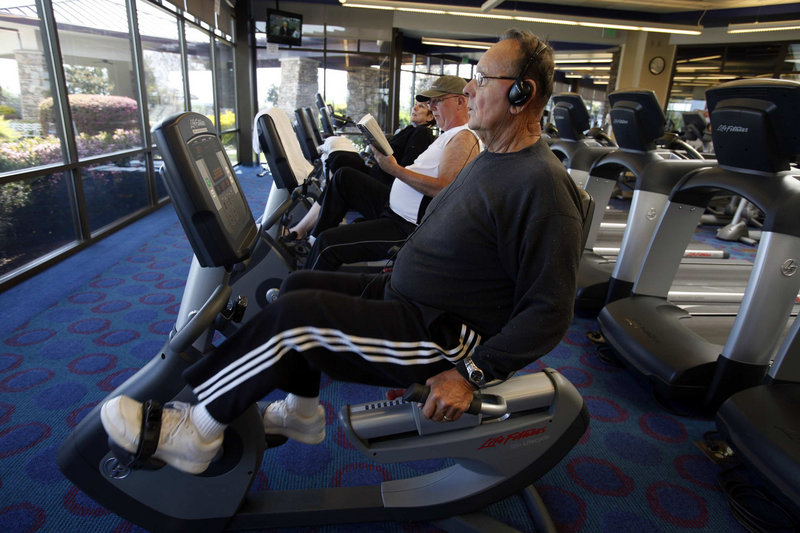LINCOLN, Calif. – The Sun City community here has just about anything active seniors could want: a fitness center, swimming pools, and an array of classes on everything from dance and aerobics to personal finance and computer skills.
Outside, residents play pickleball in the warm air, near the amphitheater where a Jimmy Buffett tribute band will kick off the summer season. Golf carts hum on the streets, and in the main lodge’s parking lot, handicapped spaces stretch out toward the horizon. In the neat neighborhoods, there’s nary a basketball hoop or spare toy in sight.
“It’s like a cruise ship that doesn’t sail,” said Sheila Safley, 64, a perky divorcee with a full social calendar who moved here in October, from nearby El Dorado Hills. “It’s like a four-star resort.”
Sun City Lincoln Hills is one reason why Lincoln was the fastest-growing city in California in the 2010 census, with a population of 42,819. That’s up from 11,205 a decade earlier, and more than a third of those new residents live in this 6,800-home retirement community completed in 2005.
But Lincoln is a town without commerce — or much of it, anyway. Vacancy signs scream from empty storefronts up and down the quaint Main Street, with its old-time movie theater and historical plaques. A sign shilling bankruptcy services leans against an empty retail complex built during the housing boom.
Its mature population is one challenge — and one that other cities might face as baby boomers age.
Older people tend not to splurge as much on apparel, entertainment and food as their younger counterparts, and they don’t have the same demands on a pocketbook as families with children. People 65 and older spend $38,000 a year on household and other expenses, on average, compared to the $59,000 a year spent by people 45 to 64, according to the Bureau of Labor Statistics.
Lincoln city manager Jim Estep, who is trying to close a $2 million hole in the city’s $13 million budget, said Sun City Lincoln Hills was a fine addition to the city. But it’s not a cash cow.
“Most retirement communities aren’t big spenders,” he noted. “We didn’t get a lot of additional revenue from there.”
Estep also blamed the limited ways his city can raise money. Sales tax growth is one of the few ways cities can boost their revenue in the wake of 1978’s Proposition 13, which limited property tax increases. And his town doesn’t currently rake in much sales tax.
“Our biggest problem is Proposition 13,” Estep said. “You end up desperately trying to get big-box retailers to come in.”
More than 10 percent of California’s population is 65 and older, according to Census data.
Lincoln gets about $50 per resident in sales tax revenue a year, compared to $276 a head in nearby Roseville, Calif., which has a giant shopping center and an auto mall.
Of course, even if Sun City Lincoln Hills was filled with free-spending seniors, the city would face a challenge trying to lure more stores to town.
Retail growth is sluggish across the state, and it’s not clear when it will come roaring back. Americans overall are saving more — about 6 percent of their income now, up from 2 percent five years ago — and local sales tax receipts have also been hurt by increased online shopping.
The economic downturn can be seen in the streets of downtown Lincoln, dotted with empty storefronts and restaurants long since abandoned.
The commerce that does exist isn’t exactly big-box. There’s an antiques shop (open 10 a.m. to 4 p.m.), a hardware store (“best prices on ammo!”) and Fashion Fo Paws, which sells canine dolls and doggie bowls. On the corner is Dillian’s, a dinky bar that is one of the city’s top 20 sources of sales tax revenue.
Some residents blame the town’s woes on those cheerful retirees up on the hill.
“Up there, they have big golf courses, but they don’t return any money back to the community,” said Cody Vent, 30, who moved here from Riverside in 2005 and was sitting with a laptop in the sandwich shop Beach Hut Deli.
“They don’t like to be a part of anything.”
Beach Hut Deli, in the Twelve Crossings development, is surrounded by vacant space. Hollywood Video, Wendy’s and Applebee’s have all recently gone out of business, as have family-owned sushi and Thai restaurants.
Buonarroti Ristorante, in the center of town, has tried to attract seniors by offering two-for-one specials. But the restaurant hasn’t seen much of a bump from the development, said manager Sheamus O’Rork.
“We get some business, but they have their own restaurants up there,” he said. “They built it so people would never have to leave.”
Larry Whitaker, a Sun City resident who has become involved in straightening out the town’s budget issues, said seniors do shop. In fact, he bought two Apple computers the other day. But he purchased them in Roseville, where the nearest Apple store is located.
“People over 65 eat out a lot; we’re always out to dinner. These are not a bunch of people running around in walkers,” he said. “We’re spending money. We’re just spending it in Roseville.”
When Sun City residents do sho–p in town, they’re not big spenders, said Kathy Dorsey, who owns Wardrobe, a clothing store in the center of Lincoln. She was also a partner in The Place, an art store in the center of town that recently closed.
“The bulk of my customers are from Sun City, and they don’t have the same demands for clothing,” she said. “Their lifestyle is different. They’re traveling more, and they’re relying on investments.”
Just about the only business in town expanding is the gun shop, run by Randy Johnson, a retiree with a white handlebar mustache, who said he needed more retail space.
To be sure, Sun City’s homes, which cost about twice as much per square foot as homes down the hill in the center of town, provide a boost to property tax revenue, and its restaurants and bars contribute to Lincoln’s sales tax revenue. But many of the most popular activities in the community don’t cost a cent.
On a recent weekday in the development’s signature restaurant, Ron Olson, 66, sipped coffee while waiters buzzed around him on plush carpets. Olson moved to Sun City with his wife in 2002.
She likes bridge, while he plays golf and softball at the $1 million Sun City field. They’ve used their retirement to travel to Australia and New Zealand, and to places such as Reno for inexpensive midweek concerts.
Olson, who used to work in defense, loved Sun City the moment he took a tour.
“Once you see it,” he said, “you don’t want to leave.”
Send questions/comments to the editors.




Success. Please wait for the page to reload. If the page does not reload within 5 seconds, please refresh the page.
Enter your email and password to access comments.
Hi, to comment on stories you must . This profile is in addition to your subscription and website login.
Already have a commenting profile? .
Invalid username/password.
Please check your email to confirm and complete your registration.
Only subscribers are eligible to post comments. Please subscribe or login first for digital access. Here’s why.
Use the form below to reset your password. When you've submitted your account email, we will send an email with a reset code.